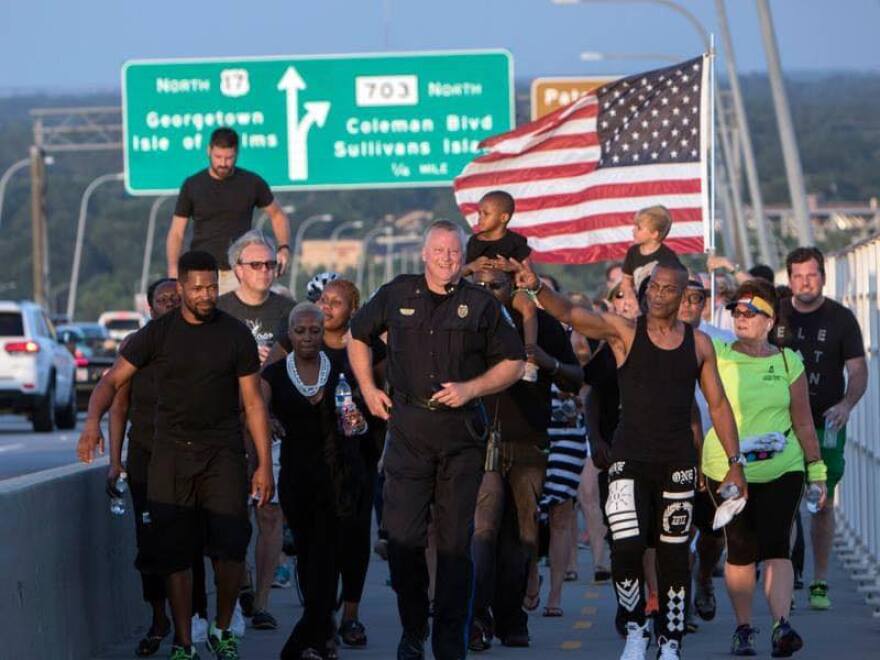Tall and broad shouldered, Charleston County’s new sheriff, Carl Ritchie, is hard to miss. And he's already a familiar face in the Lowcountry, having served in local law enforcement for more than 30 years.
“I've always had a service heart,” says Sheriff Ritchie. “I love to serve.”
As a child, the Johns Island native says he never dreamed of becoming a police officer. But he found himself taking on the role of “protector” at an early age.
“I didn’t like a bully, hated them,” says the sheriff. “And I was always a big kid so it seemed like I’d be the one who would always be there to protect somebody who couldn’t protect themselves.”
“It’s just kind of my nature,” he says.
Experience
That nature led Ritchie to serve both his country and community. He joined the Air Force serving in its Office of Special Investigations & Security Forces before returning home to work in law enforcement, first in North Charleston and later, Mount Pleasant where he was promoted to chief in 2013.
He says he found the work incredibly rewarding.
“It’s the impact that you can make on somebody who’s perhaps having the worst day of their life,” he says.

In 2021, Ritchie tried to retire but the lure of service and law enforcement still whispered in his ear, as did old friends. He says many encouraged him to run for Sheriff last year. So, he did and won. He's been on the job for less than two months.
“I just think that part of making my community safe is being from this community and being able to talk to anybody,” says Ritchie. “I don’t care what side of the aisle you’re on.”
Ritchie’s win returned the sheriff’s office to Republican leadership as it was for decades before Kristin Graziano, a Democrat and the first openly gay sheriff in the state, was elected. Much of the race between the two centered on immigration and issues at the county’s detention center under Graziano’s watch.
Challenges
Now Ritchie faces an uncertain Latino and Hispanic community that wants to know if there will be raids by federal agents with Immigration and Customs Enforcement (ICE) like those they’ve witnessed across the nation with the re-election of President Donald Trump.
The new sheriff says he’ll work with federal partners, although he has yet to release specifics.
“We will enforce the law,” says Ritchie. “We’re not out to abuse anyone, not out rounding up folks you know.”
“It’s going to be done in a fair and equitable way.”
The sheriff says he’s been meeting with not only concerned community members, but local mayors and the superintendent of Charleston County public schools.
“We’re not coming and kicking in school doors,” he says. “Not happening.”
What is happening, the sheriff says, are immediate changes at the jail following a string of inmate deaths, allegations of abuse, lawsuits and a Department of Justice investigation.
“It’s not a big hill to climb if you have the right people in place,” says Ritchie. “Even before I won the election, I had already started working on a plan.”
Within days of being sworn in, Ritchie announced he’d hired a jail director to oversee the detention center, Stanley Davis, another 30-year law enforcement veteran. The two have known each another since they were both lieutenants at the Mount Pleasant Police Department.
“If you’re trying to build a relationship during a crisis, you’ve already failed,” says Ritchie. “You have to have those relationships all along and continue to build."

Community ties
It’s a lesson the new sheriff leaned on, in 2015 as he helped organize a unity walk over the Ravenel Bridge following the racist massacre at Mother Emanuel AME church.
Just five year later, he walked again with people peacefully protesting the murder of George Floyd at the hands of a Minneapolis police officer. Ritchie says a protester thanked him afterward and asked to pray with him. The then police chief did.
But a photo on social media stirred controversy as some accused Ritchie of “taking a knee”, like athletes have done in protest during the national anthem. Ritchie stood firm in his faith.
“I was proud I could do that, and I’ll do it again with anyone who wants to kneel and pray.”
Ritchie is well known for his passion for working with people with special needs. Last year, he helped pass legislation to create a license plate for people with autism to alert authorities and better respond during accidents and traffic stops.
He’s also an advocate for Special Olympics, lighting the torch and escorting athletes on an annual run. He's even shared his love of power lifting, teaching athletes with special needs about the sport.
“We have some amazing athletes here in the Lowcountry,” Ritchie says. “They were winning gold and silver medals on the national stage.”
Ritchie, by the way, still holds the national record for deadlifting in the Law Enforcement Officer Division of USA Powerlifting, a record he broke nearly 30 years ago.



